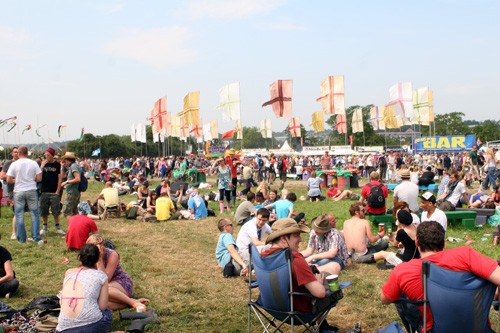
As editor of eFestivals.co.uk I was asked to appear at the end the BBC Radio Scotland's Good Morning Scotland programme, before their in depth hour long look at the festival scene in Scotland, which you can hear again here.
Commenting on the current climate of the festival season with me was Professor Joe Goldblatt, Executive Director of The International Centre For The Study of Planned Events at Queen Margaret University, in Edinburgh. After today's broadcast I spoke to Professor Goldblatt to get a little more insight into the economic future of Scottish festivals and festivals in general.
Professor Goldblatt believes the cultural sector and festivals are hugely valuable, they've survived countless other industry rise and falls throughout history, and festivals are are crucial part of the economy in Scotland, "When we surveyed tourists who came to Edinburgh, for example, over 60% said their decision was based upon attending a festival. So, in terms of tourism impact it's huge, and the United States found exactly the same thing. They found that one out of every five tourists who go on holiday, part of their holiday included attending a fair, festival, or public event. So it's a significant driver economically, socially, and in other ways."
Professor Goldblatt is optimistic about the current climate for festivals in the current economic slowdown, despite the number of events which have disappeared from the festival calendar. He pointed out that with his experience in the arts for over 35 years he has never heard of a year where people haven't worried that the next one could be worse.
Historically however recessions have been a boom time for the arts and entertainment industries, and certainly ticket sales for cinemas in the UK are at a record high. "We know from history that during a recession people need distraction, they need leisure activity to strengthen their spirit and their soul. Just as the Edinburgh International Festival in 1947 raised the spirits of Europe, that's what people are looking for now in this terrible economic period. There's certainly some challenges financially, especially for the larger festivals which have larger overheads to contend with. But I also see great opportunity for all of them, demand is going to increase. Demand is not decreasing it's increasing."
Professor Goldblatt was keen to point out that some of Scotland's largest events have become too big, hampered now not by poor ticket sales, but instead by high demand for tickets and a lack of supporting infrastructure. "Top levels events such as The Edinburgh International, and The Fringe, are definitely reaching a saturation point, but only in terms of infrastructure. We don't have enough venues or accommodation for either the performers or the guests."
The large scale events Professor Goldblatt believes will seek new avenues of income, with one of the major routes he predicts being cinema-casts. Covent Garden has already started to broadcasts its operas to cinema audiences, and Professor Goldblatt revealed that in the future they expect to generate more revenue from the cinema showings than they do from the opera itself.
I asked him if he thought festival fans worldwide would be interested in sharing the experience through the cinema as much as cultural events. "The problem with music events is the copyright, and licensing and the contracts with performers, but once that's all sorted, and it's certainly been sorted at Covent Garden and other places then for the major festival events, there's no reason why they couldn't be broadcast in surround sound all over the world."
Did the Professor believe that the number of festivals on offer during the festival year had reached saturation point? "On the micro level it has not reached saturation because we have so many ethnic groups forming, coming to this country, and so many different lifestyles that are meeting through things like Facebook, and Twitter and so on, that I don't think the smaller events have reached saturation level."
However these smaller events which celebrate culture through music, are finding that their public funding is being cut, as councils and government have less funding available for events which promote cultural diversification. It is vitally important that this funding should, he believes, continue, "It's a value statement, it says to their citizens we value the cultural harmony of civilisation, and of our society. Therefore they have to provide core funding to them."
"However the question is can they provide top off funding beyond the core? I believe that the public purse is going to shrink year on year. Therefore governments at some point have to say, 'This is what you can expect from us from a three to five year period', so that way festivals can plan. Then they must say 'in order to achieve this core funding, you must present your own plan for identifying alternative funding'."
Professor Goldblatt has produced a report entitled 'An Exploratory Study to Identify Sustainable Funding Alternatives for Cultural Events' which has outlined a few hypothesis for festivals freeing themselves of funding reliance. These include suggestions like ring fencing VAT, Voluntary Contribution Schemes, and the Audience Contribution Transfer System (ACTS Scheme). It is this latter that Professor Goldblatt feels will be the most likely to be effective.
"All of these organisations must find alternative funding." he states. "This scheme is intended to engage the audience in supporting the arts, by giving them a specific to support, every pound goes to support infrastructure, to supporting our theatres, facilities and our programming, with experimental programming to appeal to new audiences."
The ACTS Scheme was mentioned by Professor Goldblatt in the BBC programme. He feels that if The Fringe for example had added £1 to all their ticket sales for the event, they would not have needed to go to go to the council at the 11th hour to appeal for £300,000 to keep operating, they would have had a sustainable of additional funding.
"Another example is Celtic Connections over in Glasgow. They do not charge a transaction fee at the box office, so when we spoke to their organisers they said 'this is a no brainer for us, because everyone else charges a transaction fee we'll simply add a pound to support Celtic Connections', and they added another £50,000 to the bottom line."
Another important potential source of revenue for festivals is the supporting of good causes. Although the Glastonbury Festival has always had a strong positive agenda for doing this, many of the other big festivals don't take full advantage of this. Professor Goldblatt believes "Anything that's cause related, that the target audience that you're trying to attract is logical to support is a very good idea. Audiences are willing to come out in great numbers to support something where they are going to see immediate benefit."
Professor Goldblatt cites as an example of this as the phenomenal growth in the number of walks for good causes. "Cause related marketing is something that's been picked up by traditional product manufacturers for a long time, another example is the bike ride, by the vodka company, that attracted a very large gay audience, it was very successful for a number of years. In fact it grew so large, they had to abandon it because it didn't have the operational resources to continue. The reason that was so successful was that the funds went to AIDs research and AIDs care and it just struck a chord."
So, why does Professor Goldblatt feel some festivals fail? "Management! These events have become very sophisticated businesses, and unless you have a very strong busincess model, meaning your event is unique, innovative, sustainable, and you have the capital to sustain it for at least three years. A festival is just like any other business, very few businesses make money from day one, it takes from three to seven years to reach the break even or net profit level."
"That's why. Historically what typically happens at festivals is somebody comes to town like that character in 'The Music Man' the musical, and gets everybody all excited, and before the band in uniforms arrives, everybody gets mad at him, and he leaves town, and leaves them holding the bag."
"Or it's a one off. You know, 'We were successful this year, who's going to lead it next year?' and there isn't anybody there to lead it. That's what changed in terms of the business model it's now requiring very sophisticated management, good business research, to promote long term sustainability."
Professor Goldblatt is also of the opinion that the traditional way that festivals have grown and developed is also crucial to their success. Ones which have grown from smaller events hosted by the community for the community. "More importantly it has to be the idea of the local community, for it to be successful. You can't impose a festival upon a local community, it has to be organic and it has to grow from them."
He also has important words of wisdom for those festivals that are keen to have exclusive headliners, "You can have all the exclusivity deals that you wish, but at the end of the day you shouldn't put all your eggs into the basket of the major headline entertainer any more. You must provide the guests with a total experience."
"People I believe do not go to Glastonbury (Festival) I believe for the Bruce Springsteen experience. Bruce Springsteen might be the excuse, but if you probe, it's to wallow in the mud, it's to experience things with your mates that you wouldn't normally do."
I mention to the Professor that I feel that there's three types of festival goer. Those motivated by current music trends, who tend to be younger fans, for which the major events and their exclusives have much appeal. The veteran festival goer, who tends to be attracted more to festival vibe, and a few well known festival bands, and families who are taking their family holiday at festivals rather than a camping or overseas holiday.
He agrees, and adds that the it's the last group that hold the most potential for festivals. "The one that holds the greatest potential is the festival family. They don't rely upon the act, they rely upon all the infrastructure, so that it's safe, and a good experience for the entire family."
So it seems that although the festival landscape might change, there are going to be festivals around for a while yet. Small festivals might well be able to survive by dropping the corporate sponsorship and taking up the good cause, and by becoming increasingly community based, even if it's the community of all those like minded individuals who attend.
For a festival to be successful Professor Goldblatt suggests it isn't just about the music, it's about providing for the needs of all its attendees, and catering for a wide, and varied audience.
You can hear what Professor Goldblatt, and I said about festivals towards the end of the Good Morning Scotland programme, here.
Latest Updates
 Wood Festival 2025
Wood Festival 2025festival details
last updated: Today, 01:48pm
 Folk by the Oak 2025
Folk by the Oak 2025festival details
last updated: Today, 01:45pm
 Purbeck Valley Folk Festival 2025
Purbeck Valley Folk Festival 2025festival details
last updated: Today, 01:32pm
 Purbeck Valley Folk Festival 2025
Purbeck Valley Folk Festival 2025line-ups & rumours
last updated: Today, 01:31pm
 Tons of Rock 2025
Tons of Rock 2025festival details
last updated: Today, 01:30pm





